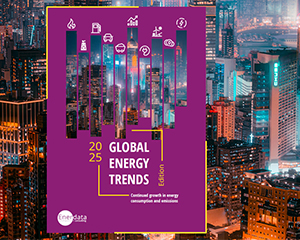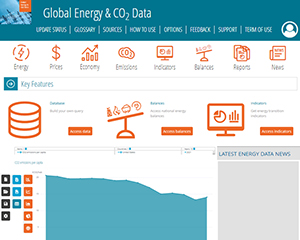Electricity production
Global power generation grew by 4.2% in 2024, much faster than the 2010-2019 average growth (+2.5%/year).
+7%
Increase in China’s power generation in 2024 (half of the global increase).
Global power generation grew by 4.2% in 2024, much faster than the 2010-2019 average growth (+2.5%/year).
In 2024, global power generation was spurred by the BRICS countries (46% of the global power generation, +6% amidst strong economic growth), the USA (+3%) and Europe (+2%, especially in France and Türkiye). Higher CO2 free power generation was the main driver in the USA (mostly solar and wind) and Europe (nuclear and hydro in France, hydro in Türkiye).
China alone accounted for half of the increase in global power generation in 2024 (+7%, reaching 32% of global power generation), amidst strong economic growth, rising demand, and dynamic renewable generation. Similar drivers contributed to raise power generation in India (+4%). As well, power generation increased in Brazil (+6%), Russia (+2%) and South Africa (+5%, over improved availability of coal-fired power plants).
Power generation rose by nearly 6% in the Middle East, especially in Iran (+6%) and Saudi Arabia (+3%) and by more than 5% in Africa (+6% in Egypt, strong rebound in South Africa). In Asia-Pacific, Vietnam, Indonesia and Malaysia posted a strong growth in power generation (nearly +11% and +6% each, respectively), whereas the increase was much slower in South Korea (+1 %), Australia (+2%) and Japan (stable). In America, the 2% growth in Mexico (mainly from gas) was offset by a 1% drop in Canada (lower hydro).
Breakdown by country (TWh)
World
Trend over 1990 - 2024 - TWh
Our 2025 edition of Global Energy Trends presents insights on essential energy data.
We have contextualised these findings against long-term climate targets :
- Which must accelerate their efforts to meet 2050 targets?
- What are the underlying drivers explaining why Europe is struggling to achieve the Paris Agreement objectives?
- Which regions are making substantial contributions to climate mitigation?
Need more data? All the information presented in this energy data tool are extracted from Global Energy & CO2 Data service, the most comprehensive and up-to-date database on all electricity production sources: hydro, nuclear, thermal, wind, solar, geothermal. Access to the whole electricity value chain information: production capacities by technology, power generation by technology, trade, prices, consumption per sector and indicators.
Discover this service


